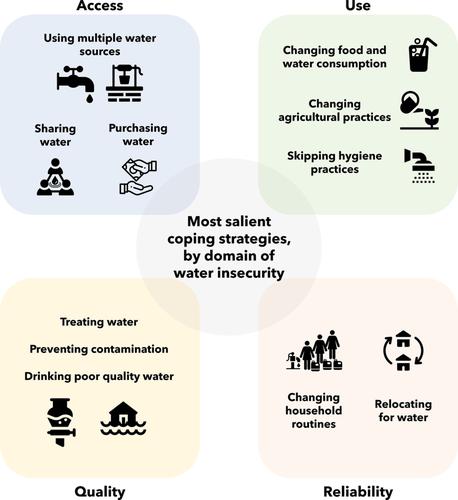当前位置:
X-MOL 学术
›
WIREs Water
›
论文详情
Our official English website, www.x-mol.net, welcomes your feedback! (Note: you will need to create a separate account there.)
Coping strategies for individual and household‐level water insecurity: A systematic review
WIREs Water ( IF 8.2 ) Pub Date : 2020-08-28 , DOI: 10.1002/wat2.1477 Vidya Venkataramanan 1 , Shalean M. Collins 1, 2 , Kathleen A. Clark 1, 3 , Julia Yeam 1 , Virginia G. Nowakowski 1 , Sera L. Young 1, 4
WIREs Water ( IF 8.2 ) Pub Date : 2020-08-28 , DOI: 10.1002/wat2.1477 Vidya Venkataramanan 1 , Shalean M. Collins 1, 2 , Kathleen A. Clark 1, 3 , Julia Yeam 1 , Virginia G. Nowakowski 1 , Sera L. Young 1, 4
Affiliation

|
Household water insecurity is a complex socioecological challenge with a range of consequences for health and wellbeing. Understanding individual and household‐level coping strategies, i.e., responses or adaptations to manage water insecurity, can shape future research and development practice. We therefore (a) systematically describe the characteristics and contexts of 173 studies documenting coping strategies and (b) classify the types of strategies within four domains of water insecurity: access, use, quality, and reliability. Most studies were from Sub‐Saharan Africa or South Asia. In the domain of access, the most common coping strategies were building infrastructure, and storing, purchasing, and sharing water. For use, changing food consumption, agricultural practices, and hygiene were most frequently mentioned. For quality, water treatment was the most common strategy. To ensure water reliability, people most frequently reported changing routines or relocating their homes altogether. Our review provides a useful framework to understand coping strategies, but more research is needed to address three gaps in particular. First, we recommend more representative exploration of the range of coping strategies, particularly in middle‐ and high‐income countries. Second, the links between coping with water insecurity and a range of other nutritional, social, financial, and health outcomes need to be better understood to address overall household wellbeing. Third, we recommend the development of a metric to quantify individual and household‐level water insecurity‐related coping strategies. This line of inquiry can enable practitioners to design and implement context‐specific interventions that leverage preexisting strategies to improve experiences of water insecurity.
中文翻译:

应对个人和家庭用水不安全的应对策略:系统回顾
家庭用水不安全是一项复杂的社会生态挑战,对健康和福祉产生一系列影响。了解个人和家庭层面的应对策略,即应对水不安全的应对措施或适应措施,可以影响未来的研发实践。因此,我们(a)系统地描述记录应对策略的173项研究的特征和背景,(b)在水不安全的四个领域(获取,使用,质量和可靠性)中对策略的类型进行分类。大多数研究来自撒哈拉以南非洲或南亚。在获取方面,最常见的应对策略是建设基础设施以及存储,购买和共享水。为了使用,最常提及的是改变食物的消费,农业习惯和卫生。为了质量,水处理是最常见的策略。为了确保水的可靠性,人们最经常报告说他们改变了惯例或完全搬家。我们的综述提供了一个有用的框架来理解应对策略,但是需要更多的研究来解决三个空白。首先,我们建议对应对策略的范围进行更具代表性的探索,尤其是在中高收入国家。其次,需要更好地理解应对水不安全状况与一系列其他营养,社会,财务和健康结果之间的联系,以解决家庭整体福祉。第三,我们建议开发一种量化个人和家庭用水不安全相关应对策略的指标。
更新日期:2020-08-28
中文翻译:

应对个人和家庭用水不安全的应对策略:系统回顾
家庭用水不安全是一项复杂的社会生态挑战,对健康和福祉产生一系列影响。了解个人和家庭层面的应对策略,即应对水不安全的应对措施或适应措施,可以影响未来的研发实践。因此,我们(a)系统地描述记录应对策略的173项研究的特征和背景,(b)在水不安全的四个领域(获取,使用,质量和可靠性)中对策略的类型进行分类。大多数研究来自撒哈拉以南非洲或南亚。在获取方面,最常见的应对策略是建设基础设施以及存储,购买和共享水。为了使用,最常提及的是改变食物的消费,农业习惯和卫生。为了质量,水处理是最常见的策略。为了确保水的可靠性,人们最经常报告说他们改变了惯例或完全搬家。我们的综述提供了一个有用的框架来理解应对策略,但是需要更多的研究来解决三个空白。首先,我们建议对应对策略的范围进行更具代表性的探索,尤其是在中高收入国家。其次,需要更好地理解应对水不安全状况与一系列其他营养,社会,财务和健康结果之间的联系,以解决家庭整体福祉。第三,我们建议开发一种量化个人和家庭用水不安全相关应对策略的指标。



























 京公网安备 11010802027423号
京公网安备 11010802027423号